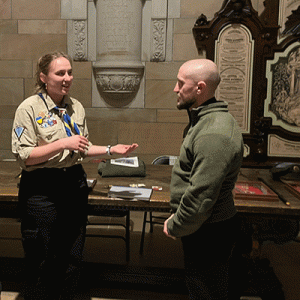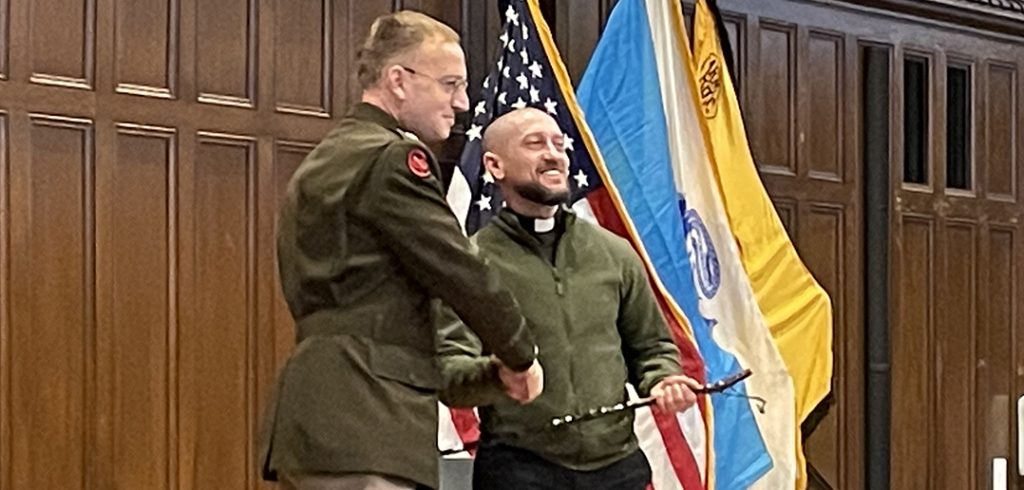“Things are happening at a scale which I could not imagine,” said Andriy Zelinskyy, S.J., during a short visit from the front lines of the war in Ukraine.
Father Zelinskyy made a 28-hour last-minute trip from Kyiv to the Bronx at the invitation of Fordham’s Army ROTC/Military Science Program and the Center on Religion and Culture after the campus Jesuit community helped make the connection. He was told by his commander last Tuesday that he had been granted a four-day leave.

After spending part of the day with cadets from eight colleges and universities who participate in the ROTC program at Fordham, the chaplain spoke to a crowd of more than 200 in the Keating Hall auditorium on March 2. LTC Paul Tanghe, director of the ROTC program and professor of military science, led a one-on-one discussion with the chaplain followed by questions from the audience.
“The greatest surprise for me is that a human being in the 21st century can be so cruel,” he said. “There is no reason for all this violence.” While he believes there is good in everyone, Zelinskyy said acts committed by Russian troops are empirical evidence of the damage caused by a corrupt society where people are so “unfree.”
The atrocities he has witnessed he only alluded to, but he said it is clear to him that Russian soldiers have been so indoctrinated they don’t know how to be human. He cited as an example the bombing of a theater clearly marked as having children inside. “That pilot knew what he was doing. There was no danger. There was no one standing over his shoulder (making him drop the bomb).”
Father Zelinskyy said that while we think of the war as a year old, he has served as a combat chaplain for nine years—since Russia’s invasion of Crimea in 2014, serving unarmed alongside soldiers on the front lines. A chaplain for 17 years in all, he served most of that time as a volunteer while advocating for Parliament to structure a formal role for chaplains in the armed forces. It did so in 2021.
He calls the role of combat chaplain “humble, but a very rich and effective ministry.” He said, “Chaplains have to find a way to share feelings with the soldiers and find sense even in the suffering. Friendship is one of the best ways. For me personally, the greatest reward is when you feel that you can unite people and reinforce them.”
An audience member asked what the rest of us can do to help.
“Don’t give up on the truth. Don’t give up on justice, on what’s really good. Don’t stop contemplating the beauty of the human heart. Stay human. That’s our responsibility,” Father Zelinskyy concluded.
The “Chaplain in Combat” audience included a contingent of 20 U.S. Army chaplains as well as a New York Army National Guard chaplain. Members of the Jesuit community, Fordham Ukrainian Society students, and Fordham College at Rose Hill Dean Maura Mast also attended.
“Fordham is the flagship of the military-connected community in New York City,” said Tanghe. This event was part of a yearlong celebration of the University’s 175-year military legacy.

